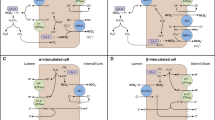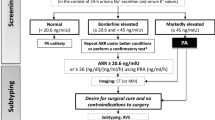Abstract
Background
The renin–angiotensin–aldosterone system (RAAS) plays pivotal roles in the pathogenesis of chronic kidney disease (CKD) progression. Aliskiren, a direct renin inhibitor, inhibits the rate-limiting step of the RAAS without any alternative pathway. It is proven to reduce albuminuria in CKD patients treated with angiotensin blockade. However, there are few reports which evaluate the advantage of aliskiren as the first-line drug against CKD progression in RAAS-activated hypertensive patients.
Methods
Tsukuba hypertensive mice (THM), double transgenic mice carrying both the human renin and human angiotensinogen genes, were fed a high-salt diet and treated with hydraladine, ramipril and aliskiren for 10 weeks. Blood pressure and urinary albumin excretion were measured every 2 weeks during the experimental period. We evaluated renal histological changes and gene expression. Plasma angiotensin concentration was measured to evaluate the RAAS inhibitory effect.
Results
High-salt-loaded THM showed severe hypertension and renal injury. All antihypertensive drugs suppressed blood pressure and prevented renal disease progression. RAAS blockade showed a higher renoprotective effect than hydraladine despite an equivalent blood pressure lowering effect. Aliskiren exhibited even stronger renoprotection than ramipril. Plasma angiotensin concentration was increased in THM fed both normal salt and high salt. Hydraladine did not alter the plasma angiotensin concentration. Ramipril significantly decreased angiotensin II concentration. Aliskiren treatment almost completely suppressed angiotensin I and resulted in lower angiotensin II concentration than ramipril treatment.
Conclusion
Aliskiren prevents renal disease progression by suppressing both angiotensin I and II in RAAS-activated pathology. Our data suggest the application of a renin inhibitor for preventing kidney disease progression in CKD patients.




Similar content being viewed by others
References
Rüster C, Wolf G. Renin-angiotensin-aldosterone system and progression of renal disease. J Am Soc Nephrol. 2006;17:2985–91.
Brewster UC, Setaro JF, Perazella MA. The renin-angiotensin-aldosterone system: cardiorenal effects and implications for renal and cardiovascular disease states. Am J Med Sci. 2003;326:15–24.
Kawarazaki H, Ando K, Nagae A, Fujita M, Matsui H, Fujita T. Mineralocorticoid receptor activation contributes to salt-induced hypertension and renal injury in prepubertal Dahl salt-sensitive rats. Nephrol Dial Transpl. 2010;25:2879–89.
Kawarazaki W, Nagase M, Yoshida S, Takeuchi M, Ishizawa K, Ayuzawa N, Ueda K, Fujita T. Angiotensin II- and salt-induced kidney injury through Rac1-mediated mineralocorticoid receptor activation. J Am Soc Nephrol. 2012;23:997–1007.
Nagase M, Matsui H, Shibata S, Gotoda T, Fujita T. Salt-induced nephropathy in obese spontaneously hypertensive rats via paradoxical activation of the mineralocorticoid receptor: role of oxidative stress. Hypertension. 2007;50:877–83.
Jafar TH. Angiotensin-converting enzyme inhibitors and progression of nondiabetic renal disease: a meta-analysis of patient-level data. Ann Intern Med. 2001;135:73.
Balamuthusamy S, Srinivasan L, Verma M, Adigopula S, Jalandhara N, Jalandara N, Hathiwala S, Smith E. Renin angiotensin system blockade and cardiovascular outcomes in patients with chronic kidney disease and proteinuria: a meta-analysis. Am Heart J. 2008;155:791–805.
Morganti A, Lonati C. Aliskiren: the first direct renin inhibitor available for clinical use. J Nephrol. 2011;24:541–9.
Hollenberg NK, Osei SY, Lansang MC, Price DA, Fisher ND. Salt intake and non-ACE pathways for intrarenal angiotensin II generation in man. J Renin Angiotensin Aldosterone Sys. 2001;2:14–8.
Krop M, Garrelds IM, De Bruin a RJ, Van Gool JMG, Fisher NDL, Hollenberg NK, Jan Danser a H. Aliskiren accumulates in renin secretory granules and binds plasma prorenin. Hypertension. 2008;52:1076–83.
Fukamizu A, Sugimura K, Takimoto E, Sugiyama F, Seo MS, Takahashi S, Hatae T, Kajiwara N, Yagami K, Murakami K. Chimeric renin-angiotensin system demonstrates sustained increase in blood pressure of transgenic mice carrying both human renin and human angiotensinogen genes. J Biol Chem. 1993;268:11617–21.
Kai T, Sugimura K, Shimada S, Kurooka A, Takenaka T, Ishikawa K. Enhanced angiotensin II stimulates renal disorders in transgenic Tsukuba hypertensive mice. Blood Press. 1998;7:247–50.
Suzuki H, Okada K, Abe M, Maruyama N, Yoshida Y, Baba S, Takashima H, Soma M. Aliskiren reduces home blood pressure and albuminuria in patients with hypertensive nephrosclerosis. Clin Exp Nephrol 2013;17:386–395.
Parving H–H, Persson F, Lewis JB, Lewis EJ, Hollenberg NK. Aliskiren combined with Losartan in type 2 diabetes and nephropathy. N Engl J Med. 2008;358:2433–46.
Pilz B, Shagdarsuren E, Wellner M, Fiebeler A, Dechend R, Gratze P, Meiners S, Feldman DL, Webb RL, Garrelds IM, Jan Danser AH, Luft FC, Müller DN. Aliskiren, a human renin inhibitor, ameliorates cardiac and renal damage in double-transgenic rats. Hypertension. 2005;46:569–76.
Huang L, Howard CG, Mitchell KD. Chronic direct renin inhibition with aliskiren prevents the development of hypertension in Cyp1a1-Ren2 transgenic rats with inducible ANG II-dependent hypertension. Am J Med Sci. 2012;344:301–6.
Kavvadas P, Weis L, Abed AB, Feldman DL, Dussaule J-C, Chatziantoniou C. Renin inhibition reverses renal disease in transgenic mice by shifting the balance between profibrotic and antifibrotic agents. Hypertension. 2013;61:901–7.
Rakusan D, Kujal P, Kramer HJ, Husková Z, Vanourková Z, Vernerová Z, Mrázová I, Thumová M, Cervenka L, Vanecková I. Persistent antihypertensive effect of aliskiren is accompanied by reduced proteinuria and normalization of glomerular area in Ren-2 transgenic rats. Am J Physiol Renal Physiol. 2010;299:F758–66.
Nagase M, Yoshida S, Shibata S, Nagase T, Gotoda T, Ando K, Fujita T. Enhanced aldosterone signaling in the early nephropathy of rats with metabolic syndrome: possible contribution of fat-derived factors. J Am Soc Nephrol. 2006;17:3438–46.
Kobayashi H, Shimamoto K, Moriguchi O, Miyahara M. A sensitive radioimmunoassay for the determination of plasma angiotensin II in human subjects. Jpn Circ J. 1979;43:727–33.
Yoshida S, Nagase M, Shibata S, Fujita T. Podocyte injury induced by albumin overload in vivo and in vitro: involvement of TGF-beta and p38 MAPK. Nephron Exp Nephrol. 2008;108:e57–68.
Shibata S, Nagase M, Yoshida S, Kawarazaki W, Kurihara H, Tanaka H, Miyoshi J, Takai Y, Fujita T. Modification of mineralocorticoid receptor function by Rac1 GTPase: implication in proteinuric kidney disease. Nat Med. 2008;14:1370–6.
Lambers Heerspink HJ, De Borst MH, Bakker SJL, Navis GJ. Improving the efficacy of RAAS blockade in patients with chronic kidney disease. Nat Rev Nephrol. 2013;9:112–21.
Sato A, Piao H, Nozawa Y, Morioka T, Kawachi H, Oite T. Local delivery of a direct renin inhibitor into the kidney ameliorates progression of experimental glomerulonephritis. Clin Exp Nephrol. 2012;16:539–48.
Edling O, Bao G, Feelisch M, Unger T, Gohlke P. Moexipril, a new angiotensin-converting enzyme (ACE) inhibitor: pharmacological characterization and comparison with enalapril. J Pharmacol Exp Ther. 1995;275:854–63.
Nagase M. Activation of the aldosterone/mineralocorticoid receptor system in chronic kidney disease and metabolic syndrome. Clin Exp Nephrol. 2010;14:303–14.
Feldman DL, Jin L, Xuan H, Contrepas A, Zhou Y, Webb RL, Mueller DN, Feldt S, Cumin F, Maniara W, Persohn E, Schuetz H, Jan Danser a H, Nguyen G. Effects of aliskiren on blood pressure, albuminuria, and (pro)renin receptor expression in diabetic TG(mRen-2)27 rats. Hypertension. 2008;52:130–6.
Acknowledgments
We are grateful to Novartis Pharma K.K. for providing aliskiren. This work was partially supported by a Grant-in-Aid for Scientific Research from the Japan Society of the Promotion of Science (22790782) given to S.Y.
Conflict of interest
All the authors have declared no competing interest.
Author information
Authors and Affiliations
Corresponding author
Electronic supplementary material
Below is the link to the electronic supplementary material.
About this article
Cite this article
Yoshida, S., Ishizawa, K., Ayuzawa, N. et al. Renin inhibition ameliorates renal damage through prominent suppression of both angiotensin I and II in human renin angiotensinogen transgenic mice with high salt loading. Clin Exp Nephrol 18, 593–599 (2014). https://doi.org/10.1007/s10157-013-0893-6
Received:
Accepted:
Published:
Issue Date:
DOI: https://doi.org/10.1007/s10157-013-0893-6




